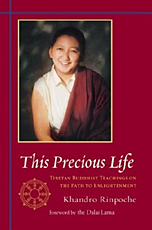Khandro Rinpoche is the head of a Tibetan Buddhist nunnery in India and divides her time between teaching in the West, running the nunnery, and supporting charity projects for Tibetan refugees in India. Using the umbrella of the Four Reminders — the preciousness of human birth, the truth of impermanence, the reality of suffering, and the inescapability of karma — the author draws out many of the riches of the Tibetan Buddhist tradition. We all suffer from hatred, violence, pain, and other difficulties, Khandro Rinpoche notes, but the intensity of our suffering is brought on by our refusal to let go of illusions, particularly the large repertoire of stories we have told ourselves about reality.
We have a precious existence and yet we continue to ignore the bounties of everyday life. Khandro Rinpoche expounds on the meaning of the eight freedoms and the ten endowments which comprise the eighteen qualities. These make it possible for us to bring our existence to fruition. Contemplating our freedoms and endowments enables us to generate courage and compassion within. She also discusses how the practice of the ten virtuous actions of body, speech and mind can work wonders in our lives.
One of the deepest teachings is the following: "To train the mind, we must understand the sacredness of everything at all times. No one direction is better than another, because all directions are sacred. No one object is more pure, because everything is pure as it is. And no one person is better or needier than another. The interpretive mind constantly makes these judgments based on what we can get from them. Such discrimination influences awareness and envelops the mind in ignorance. Discriminating kindness is partial kindness; discriminating devotion based on likes and dislikes becomes partial devotion — until everything that arises is contaminated with ignorance. Train the mind instead to be impartial and aware at all times." Pondering these insights, we can come closer to the true appreciation of our absolute true nature.
